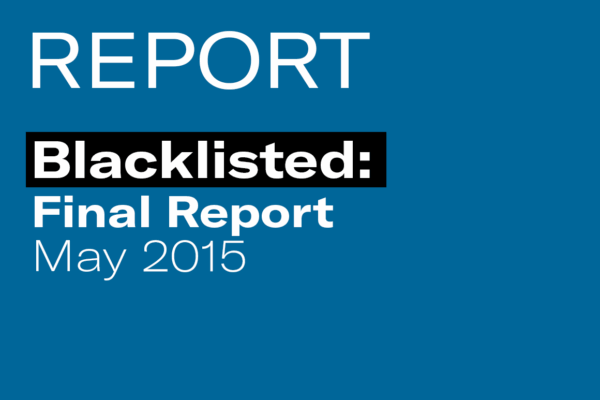Racial disparities in suspensions at Rhode Island’s schools reached their highest rates in a decade last year, according to a new report issued today by the American Civil Liberties Union of Rhode Island. The report, “Blacklisted: 2013-2014,” found that while white students experienced a ten-year low in suspensions during the 2013-2014 school year, the combined suspension rate for Hispanic, black and Native American students was at its highest level.
According to the report, significant racial disparities were found in school districts across the state, began as early as elementary school, and affected black girls as well as boys. These findings come just one year after the federal government issued guidance to school districts that suspension use should be minimized, and as the Rhode Island General Assembly considers legislation to prohibit suspensions for low-risk behavioral offenses.
Among the report’s findings:
- Black students were suspended from school more than twice as often as would be expected based on their representation in the student body population. Hispanic students were suspended more than one-and-a-half times as often as expected, the highest rate in a decade, while white students experienced a ten-year low.
- Black girls were nearly four times more likely than white girls to be suspended, including for minor, vague offenses like “disorderly conduct” and “disrespect.”
- Black elementary school students were suspended at a rate nearly three times the rate expected given their representation in the population, while white elementary school students were suspended just half as often as expected.
- The racial disparities in discipline are statewide: 24 school districts and two charter schools suspended black students at rates disproportionately higher than their representation in the student body, while 21 districts and two charter school disproportionately suspended Hispanic students.
- Despite an increasing consensus nationwide that suspensions should be reserved as discipline only in very serious circumstances, more than half of all suspensions were issued for “Disorderly Conduct” or “Insubordination/Disrespect.”
The ACLU was joined by representatives from the NAACP Providence Branch, Rhode Island Kids Count, the Univocal Legislative Minority Advisory Commission, Youth in Action, the Rhode Island State Council of Churches, and other community groups and advocates to announce the report’s findings. The groups called on legislators and school officials to address racial bias in school discipline, noting that cities and towns such as Baltimore, Maryland and Ferguson, Missouri are grappling now with the long-term consequences of an unchecked “school to prison pipeline.” The groups specifically recommended that steps, including passage of legislation, be taken to limit out-of-school suspensions to serious offenses, and that school districts work with the community to investigate new disciplinary methods, such as restorative justice and peer counseling.
The report concluded: “Today’s youth become tomorrow’s adults, and minimizing the use of suspensions now ensures that these youth enter adulthood with an education to build upon, not a past to overcome.”
Hillary Davis, the ACLU of RI’s policy associate and author of the report, said: “Rhode Island’s schools have for too long relied on suspensions to address minor behavioral issues, disproportionately pushing black and Hispanic students out of the classroom instead of keeping our children in school where they belong. The long-term effects of suspensions are serious and well-documented, and Rhode Island cannot afford to wait for those effects to boil over before we address this long-simmering, rectifiable issue.”


